DJ BENTHOS RAVES TO STOP DEEP SEA MINING
17.04.2024
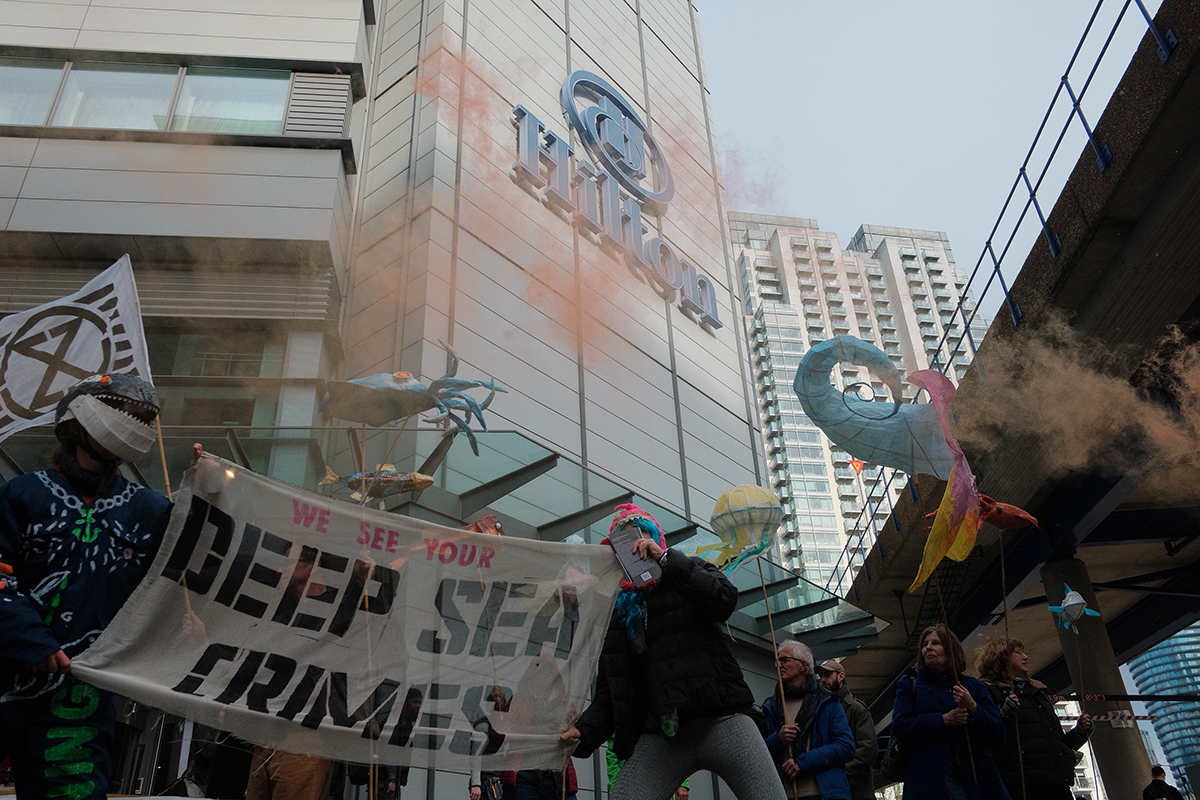
⬆️ The Hilton Hotel, Canary Wharf, home to the deep sea mining industry for two days, 17 – 18 April.
—
Is it a squid, is it a whale, is it disorientated? No it’s DJ Benthos and his beautiful deep sea creatures!
In the evening of 17 April the Polymetallic Nodules returned to the Deep Sea Summit at the Hilton Hotel, Canary Wharf, to introduce another noise from the deep – DJ Benthos.
DJ Benthos was joined by representatives of deep sea marine life, marine life who call deep sea marine scapes like the Clarion Clipperton Zone a home.
—
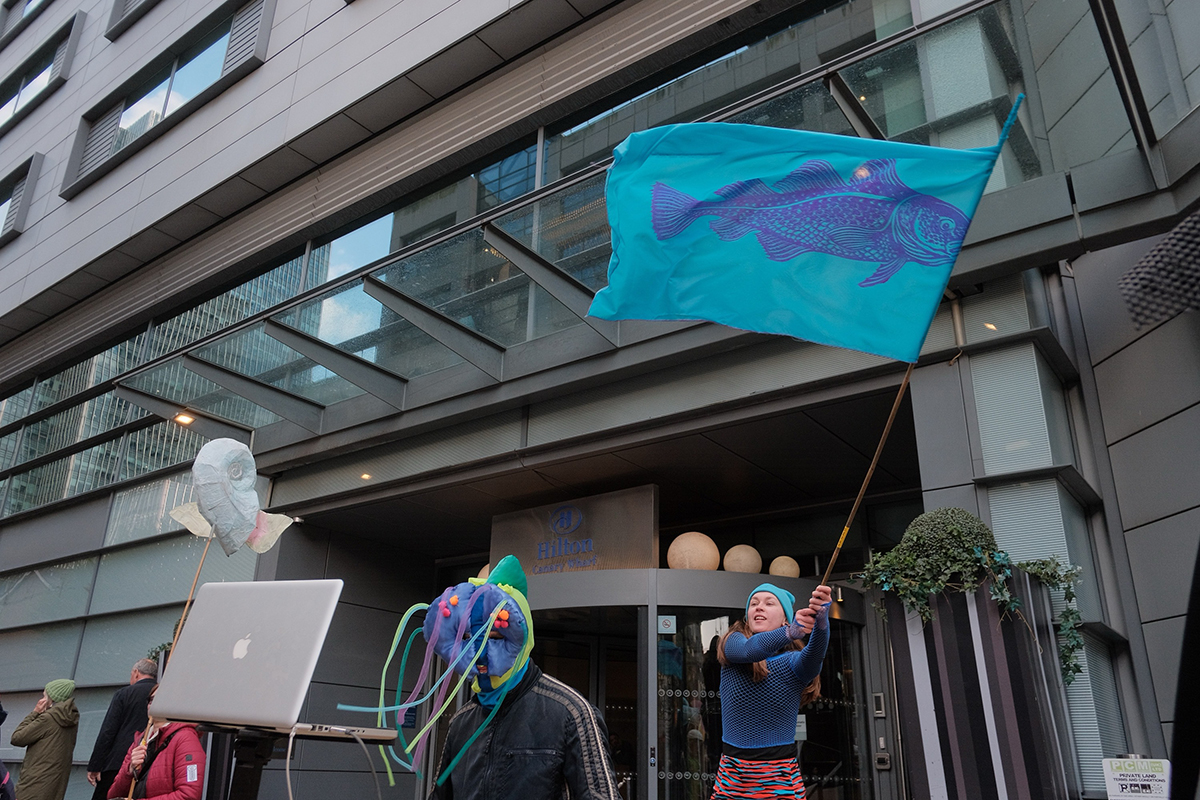
⬆️ DJ Benthos controls the deck of the good ship ‘Nodule’.
—
The beautiful ravers gyrated to the dystopian deep sea bass and beats formed from the oppressive sound of deep sea mining machinery, haunting ship horns and whale song samples. None of the rave was as loud as the sound of real deep sea mining machinery, a noise so loud it send shocks waves out across the Ocean for over 500km, disorientating all migratory marine life.
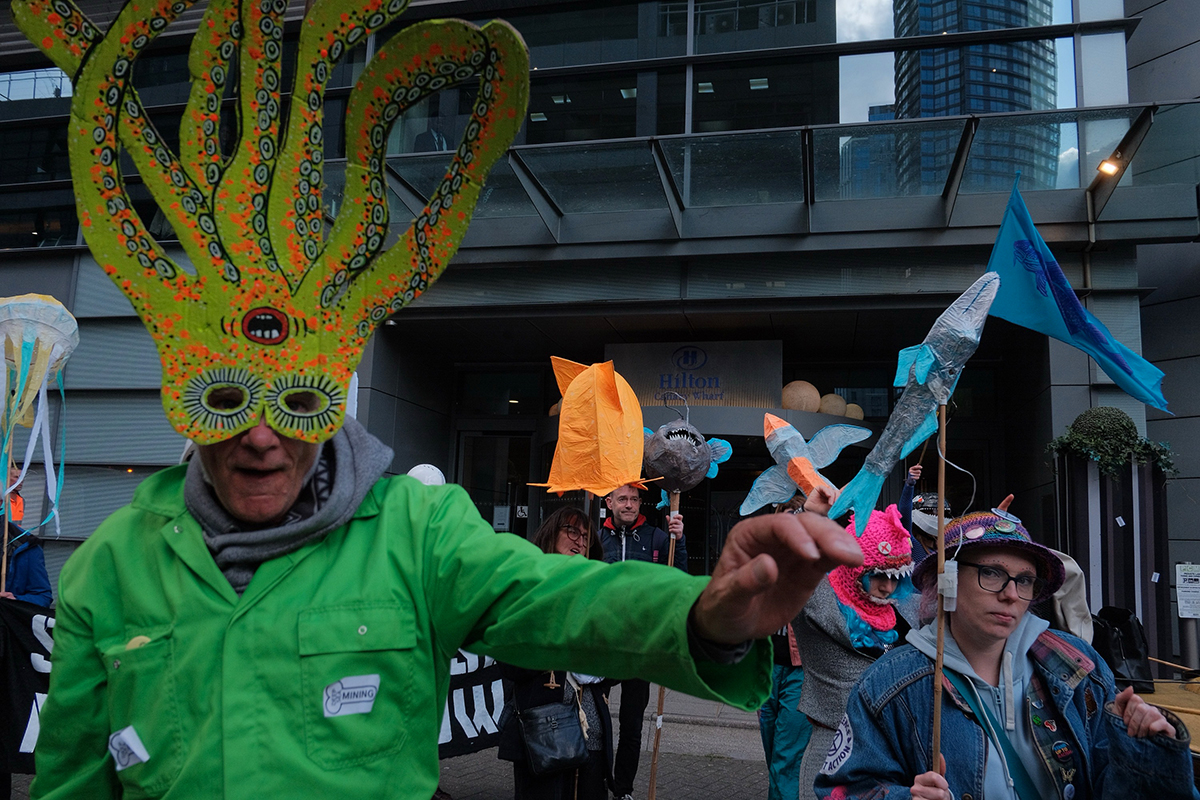
⬆️ The sea ravers were watched by the deep sea mining delegates. Some of them even joined the growing crowd for a dance.
—
DJ Benthos and his Deep Sea Ravers are a reminder of what we will lose, even before we know it’s there – the mysterious beauty of the Deep Sea. A truly magical, other-worldly, seascape. It has fired the human imagination across cultures for centuries. It is a shared place of wonder, free from human ownership, and it must remain this way.
But the attendees of the Deep Sea Mining Summit don’t view the deep sea this way. They see it as an opportunity to exploit a ‘human commons’ for their own benefit. They want to get rich off the back of a new gold rush, a rush that will cause the extinction of many unique species of marine life.
This ‘human commons’ doesn’t belong to them, it belongs to the marine life that truly calls it a home. Deep Sea Mining in areas like the Clarion Clipperton Fracture Zone (CCFZ) (Pacific Ocean) will destroy the deep seabed and the life that depends on it, destroying corals and sponges that have taken thousands of years to grow. Their deep sea mining also causes sediment plumes to rise upwards through water columns harming even more marine life. Toxic metals will inevitably find their way into the food chain – we just don’t know how catastrophic deep-sea mining will be but we know it will be catastrophic.
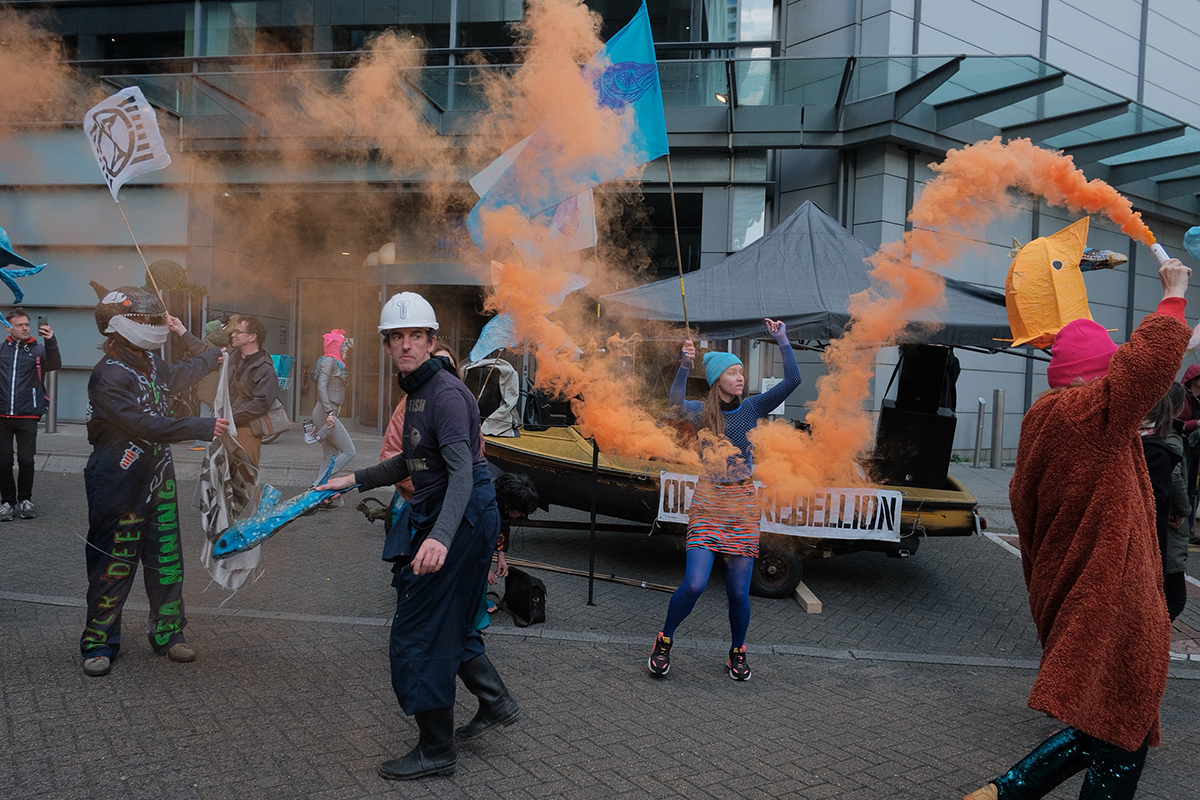
⬆️ Like smoke finds its way into our lungs, the toxins released by deep sea mining will find its way into sea life throughout the Ocean.
—
A massive area will be ruined
The UN International Seabed Authority (ISA) can award licences to mine 8,000 to 9,000 square kms of deep seabed at a time*. This area is equivalent to one third of Belgium. That’s one third of Belgium stripped clean of all life, hard to imagine this being allowed on land isn’t it? Why does the ISA think it’s ok to do it at sea?
Who is the ISA?
The ISA is supposed to manage the high seas for the ‘benefit of [hu]mankind’. At the same time it profits from selling licences to mine. How can a UN agency be allowed to profit from something it is designed to protect? And why is a UN agency allowed to act against its own ‘precautionary principles’? Is profit the only measure the ISA is considering? There is a lot of smoke around the ISA, it’s governance is opaque and seems to be designed to enrich the rich. Like its sister UN body the International Maritime Organisation (IMO) the ISA is filled with industrial representatives who have a big say in the decision making process.
Controversy
The ISA is supposed to manage the high seas for the ‘benefit of [hu]mankind’. At the same time it profits from selling licences to mine. How can a UN agency be allowed to profit from something it is designed to protect? And why is a UN agency allowed to act against its own ‘precautionary principles’? Is profit the only measure the ISA is considering? There is a lot of smoke around the ISA, its governance is opaque and seems to be designed to enrich the rich. Has the ISA gone rogue, and shouldn’t the UN call it to heel?
The fate of the Ocean depends on us all.
Our interventions depend on your support.
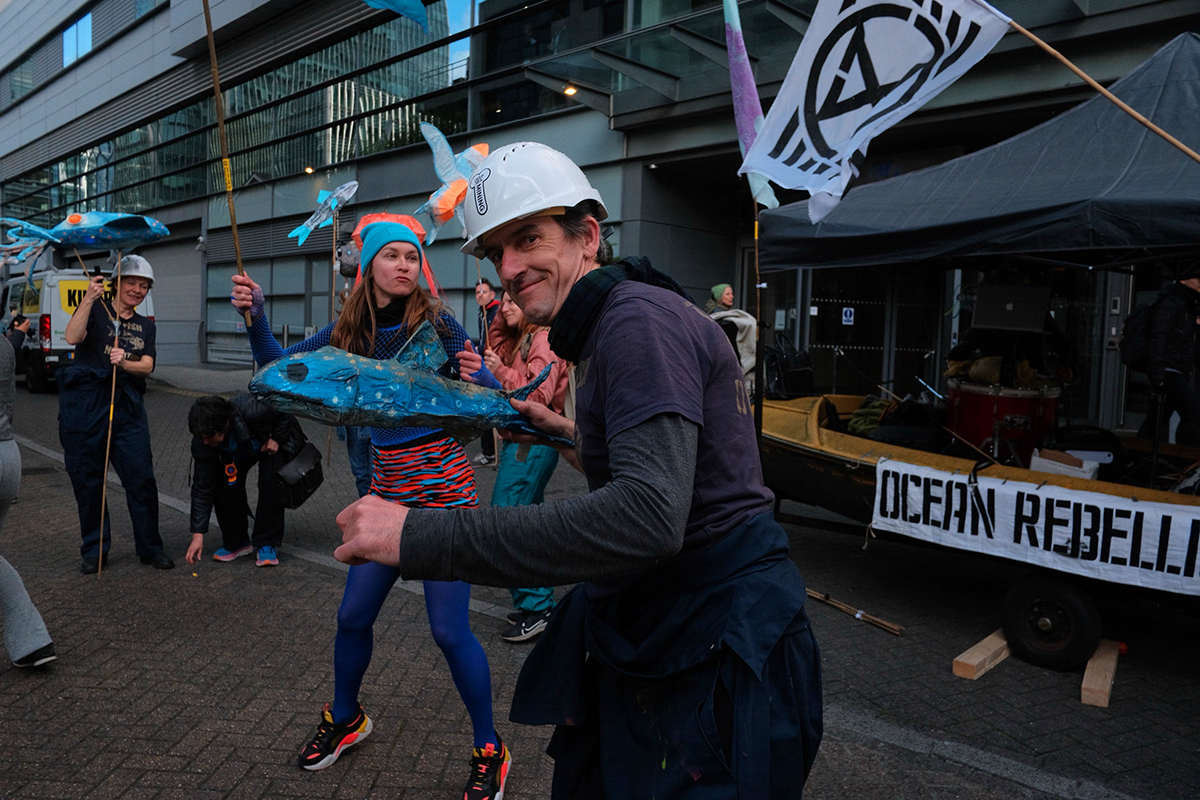
⬆️ A deep sea miner, wearing his dick head, raves to the deep bass.
—
DJ Benthos says:
“In deep sea mining we have an opportunity to stop a contributor to environmental destruction before it has started. We genuinely don’t need to mine the deep sea, we have the minerals we need already. The companies attending this summit are just looking to fill their pockets with investor capital.”
stop deep sea mining before it starts
Ocean Rebellion demands an end to Deep Sea Mining. Together with a root and branch reform of the ISA. This reform must focus on protecting the deep (and high) seas on behalf of ALL life and future generations.
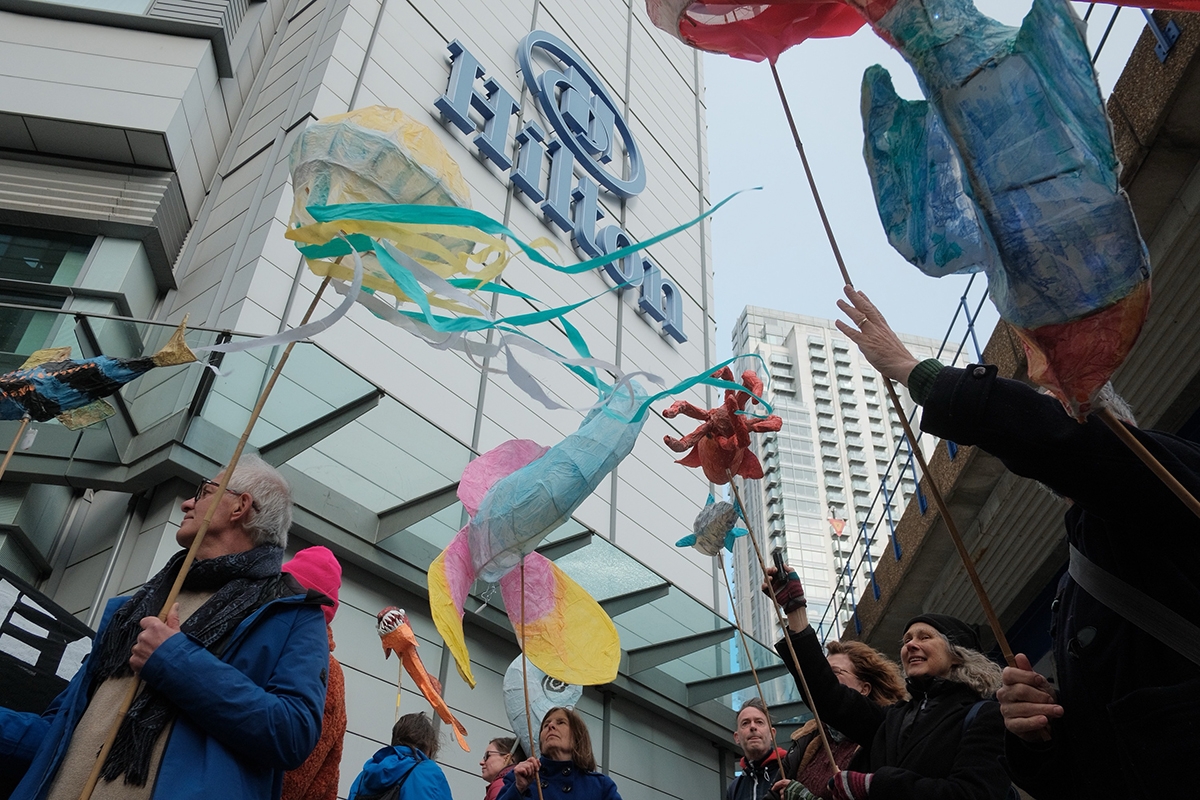
⬆️ The deep sea creatures, representatives of the deep, thronged beneath the Hilton Hotel signage hoping their presences would convince the hotel to never host the summit again.
—
Photos by João Daniel Pereira.
—
*The ISA has granted over thirty exploration licences to date, and if all 17 of the current mining claims in the Clarion Clipperton Zone were to be mined, the overall impact to the seabed would likely extend from some 350,000-800,000 km2 based on recent estimates from scientists (Smith et al., 2020).
The fate of the Ocean depends on us all.
We’ll let you know what we’re doing to help.